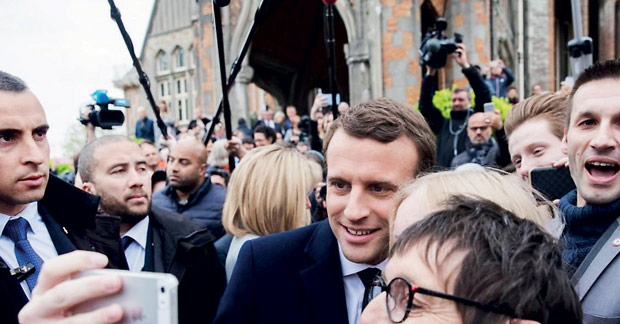26 Apr 2017 - {{hitsCtrl.values.hits}}

By Griff Witte, Michael Birnbaum
(c) 2017, The Washington Post · Apr 25, 2017
BERLIN - In this era of fiery populism and muscular anti-globalist forces, politicians across Europe are suddenly discovering an electoral surprise.
It might actually pay to embrace the European Union.
The top finisher in the first round of the French presidential election on Sunday is Emmanuel Macron, a 39-year-old centrist who jets to Berlin to give speeches in English. The blue-and-yellow banner of the EU flutters off his campaign headquarters. He is strongly favoured to beat his anti-Europe rival, Marine Le Pen, in a May 7 runoff.
After years in which the EU was the favourite foil for ascendant politicians on the continent, the 28-nation club may be making a comeback despite Brexit and President Donald Trump’s euroskepticism. The Netherlands’ staunchly pro-European Green Left party quadrupled its support in elections last month. The former European Parliament president Martin Schulz is surging in polls ahead of September elections
in Germany.
And Macron has promised, if elected, to help lead “an ambitious Europe,” restoring France to a pre-eminent place in the EU after years in which the French role has been diminished by its domestic struggles with unemployment, terrorism and political dysfunction. He pledges to push for reforms that would force stronger nations to protect
weaker ones.
Sunday’s balloting showed French attitudes toward Europe split down the middle, with euroskeptic politicians winning nearly half the vote. In addition to Le Pen, Jean-Luc Mélenchon, a far-left candidate, drew millions of votes. Opinion polls examining EU attitudes revealed conflicted feelings, with a majority of French respondents describing themselves as pro-EU but saying the institution needed deep reforms.
Given such division, European leaders nervously watched the first-round voting to see which way France might tilt. On Monday, many political figures were unusually public about their support for Macron.
German Chancellor Angela Merkel’s chief of staff, Peter Altmaier, tweeted that Macron’s first-place finish showed that “France AND Europe can win together. The centre is stronger than the
populists think!”
The centrist German lawmaker Alexander Lambsdorff heaped on more praise. Macron is “a French John F. Kennedy,” he told Germany’s ZDF television on Monday.
In a rare display of cross-continental comity, Macron also was congratulated by Greek Prime Minister Alexis Tsipras, a combative leftist who has sparred with the German government ever since he was forced to accept a humiliating bailout in 2015.
Pro-EU politicians were not the only ones to focus on Macron’s attitudes toward Europe.
Nigel Farage, the British anti-EU politician who helped lead last year’s Brexit campaign, tweeted dismissively that Macron gave his victory speech Sunday night “with EU flag behind him. Says it all.”
Leaders in Europe normally maintain a studious silence when the vote isn’t on their turf. That they didn’t in this case reflects the gravity for Europe of the final round of the French vote.
If Macron is elected - and opinion polls suggest he has a comfortable lead over Le Pen despite his first-round squeaker - continental leaders are cautiously optimistic that he can steer the beleaguered country back to its historically central role in European affairs. If Le Pen wins, modern Europe - defined by integration and growing cooperation across national boundaries - could fall apart after already being jolted by Britain’s decision to exit the EU
Analysts believe that if Macron can put more of a Gallic stamp on the EU machinery in Brussels, he may have a chance to shift France’s complicated attitude toward the bloc back toward more positive ground, particularly if he can also jump-start his country’s stalled economy.
“The French liked Europe when it was a greater France, but they feel today that it’s no longer the case. It’s a greater Germany,” said Eddy Fougier, an expert on anti-globalization movements at the French Institute for International and Strategic Affairs.
For all their concerns about the EU, voters may be becoming more wary of disruptive European politicians as they watch Trump churn up political turmoil in the United States and Britain solidify its EU divorce plans.
Dutch euroskeptic leader Geert Wilders crashed out of front-runner status ahead of March elections in the Netherlands. Germany’s euroskeptic Alternative for Germany party spiked after Trump’s election but has more recently split and sputtered. Now the ascendant political force in Germany is Schulz, a centre-left leader who spent more than two decades as a member of the European Parliament and has staked his career on a robust defence
of Brussels.
And though Italy’s anti-establishment Five Star party is doing well before elections that must be called before spring 2018, few observers see them as the existential threat to Europe that a Le Pen presidency would be.
The support for the centrist politicians reflects “a reasonable approach to a reality that everybody must recognize, and that is the European Union,” said Daniel Cohn-Bendit, a Franco-German former European lawmaker who supported Macron.
“Today more and more people are concerned about how we can protect Europe and the European project,” Cohn-Bendit said. “This has a link with Trump’s election, with Brexit.”
At a time when the EU’s popularity is on the wane, Macron has stood apart for his unabashed support for Europe and globalization. On a January trip to Berlin’s Humboldt University, he switched to flawless English to exhort students to build a stronger Europe. The move drew praise in Germany - and darts from his far-right rivals, who said he was disrespecting the French language.
As the European powers-that-be closed ranks around Macron on Monday, they took two major risks. One is that by backing the French centrist, they will fan the flames of anti-establishment ire that have propelled Le Pen’s rise.
17 Nov 2024 33 minute ago
17 Nov 2024 50 minute ago
17 Nov 2024 59 minute ago
17 Nov 2024 1 hours ago
17 Nov 2024 4 hours ago